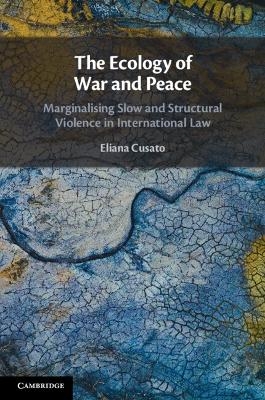
The Ecology of War and Peace
Cambridge University Press (Verlag)
978-1-108-93101-4 (ISBN)
The connection between ecology and conflict has been the object of extensive study by political scientists and economists. From the contribution of natural resource 'scarcity' to violent unrest and armed conflict; to resource 'abundance' as an incentive for initiating and prolonging armed struggles; to dysfunctional resource management and environmental degradation as obstacles to peacebuilding, this literature has exerted a huge influence upon academic discussions and policy developments. While international law is often invoked as the solution to the socio-environmental challenges faced by conflict-affected countries, its relationship with the ecology of war and peace remains undertheorised. Drawing upon environmental justice perspectives and other theoretical traditions, the book unpacks and problematizes some of the assumptions that underlie the legal field. Through an analysis of the practice of international courts, the UN Security Council, and Truth Commissions, it shows how international law silences and even normalizes forms of structural and slow environmental violence.
Eliana Cusato is a Marie Curie post-doctoral Fellow at the Amsterdam Centre for International Law, University of Amsterdam. She holds a Ph.D. in Law from the National University of Singapore. Previously, she was a lecturer at Essex Law School. She serves on the editorial board of the Asian Journal of International Law.
1. Introduction: international law, violence and visibility; Part I: Concepts, Theories, and Debates: 2. The ecology of war and peace: unpacking the assumptions; 3. Origins and evolutions of legal debates on the environment-conflict 'nexus'; Part II: The Practice of International Law: 4. War crimes tribunals and the International Court of Justice: nature between property protection and humanitarian concerns; 5. The United Nations Security Council: from 'conflict resources' to climate change as a 'threat' to international peace and security; 6. Truth commissions: conflicts over extractive resources and the battle for different views of nature; 7. Conclusion: towards a political ecology of international law.
| Erscheinungsdatum | 10.08.2024 |
|---|---|
| Zusatzinfo | Worked examples or Exercises |
| Verlagsort | Cambridge |
| Sprache | englisch |
| Gewicht | 413 g |
| Themenwelt | Recht / Steuern ► EU / Internationales Recht |
| Recht / Steuern ► Öffentliches Recht ► Umweltrecht | |
| ISBN-10 | 1-108-93101-4 / 1108931014 |
| ISBN-13 | 978-1-108-93101-4 / 9781108931014 |
| Zustand | Neuware |
| Haben Sie eine Frage zum Produkt? |
aus dem Bereich


